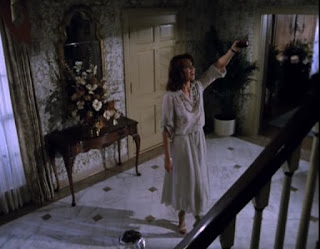There are just two possible outcomes to the infection: death or eternal craziness. The only problem is that among all the people dying in the film, almost no one dies from the disease. And literally everyone is acting crazy, one way or another. But of course, the harder it becomes to demarcate, the bigger the need for demarcation grows. Both the ad hoc police state and the quickly thrown together rebel group are completely compromised from the start, and each new in-group friction feeds into the systematically escalating conflict.
As much as I enjoy Romero's zombie imagery in the Dead films, its very absence, in combination with the vagueness and almost invisibility of the menace, makes The Crazies into Romero's most radical film.
Even more than usual in early Romero, the barebones production budget works towards the films advantage: from the beginning the film renounces convernional world building in favor of a series of claustophobic, highly effective chamber dramas.
The Crazies feels like something quickly assembled from hand-drawn sketches and cardboard boxes. At the same time it is a masterpiece, maybe Romero's best and almost certainly his purest film.
As much as I enjoy Romero's zombie imagery in the Dead films, its very absence, in combination with the vagueness and almost invisibility of the menace, makes The Crazies into Romero's most radical film.
Even more than usual in early Romero, the barebones production budget works towards the films advantage: from the beginning the film renounces convernional world building in favor of a series of claustophobic, highly effective chamber dramas.
The Crazies feels like something quickly assembled from hand-drawn sketches and cardboard boxes. At the same time it is a masterpiece, maybe Romero's best and almost certainly his purest film.








































































